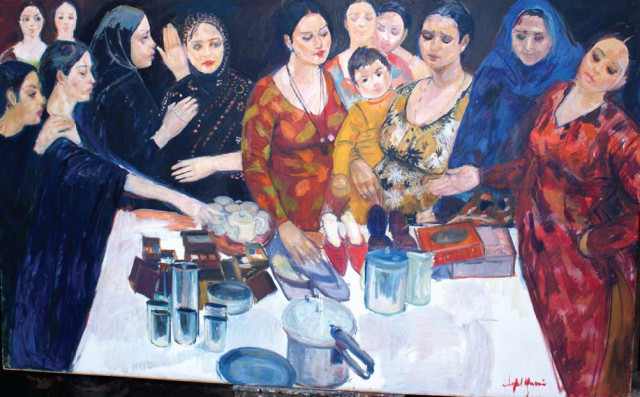The Toulouse-Lautrec of Pakistan returns with another bout of controversy
In every society there is a community, inconvenient to many, that people prefer to brush under the rug and ignore.

It takes courage to face one’s past, Hussain does not apologise for his and he does not preach or interpret. He paints what he knows - Lahore’s Old Walled City and the courtesans amid whom he was raised.
“It’s the life around me,” he told Victoria Burnett of The Globe and Mail. “What fascinates me is their stories, their experiences of what they have gone through in their lives. I am just constantly on one subject: my women and my neighbourhood.”
His avant-garde approach to women, ensnared in society’s perception of depravity, captures the essence of their humanity that is so easily overlooked by elitists.
To anyone unfamiliar with the dupattas and downcast eyes required to attest a woman’s reticence in our society, Iqbal’s women appear commonplace. They are not prancing about suggestively nor are they provocatively angled. However, their postures imply a lack of hiss or modesty — the trademark of a respectable woman in Islamic culture.
Their blank eyes and fatigued expressions give the observer an insight into the struggle their dehumanising profession and reputation puts them through. “By treating them as human beings, I’ve restored their self-confidence and self-respect,” he explained to Now’s John Frederick.
‘His Vision’ shows the women going about their daily lives. He makes use of gentle colours and strokes and manages to soften the harsh colours his subjects typically wear. He also gives particular importance to light and hue and stays true to the aesthetics of oil painting.
Strategically placed mirrors in his work reflect more than what people want to see. He has included a self-portrait in this collection with a fittingly dark and sinister background. Yet, the twinkle in his grey eyes is visible and his assured sense of self shines through.
Hussain is not trying to force people to accept and welcome these women. He is not objectifying them or revering them. He is simply asking society to acknowledge their presence.
Published in The Express Tribune, February 20th, 2011.



















COMMENTS
Comments are moderated and generally will be posted if they are on-topic and not abusive.
For more information, please see our Comments FAQ